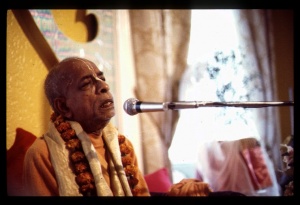SB 10.69.25: Difference between revisions
m (1 revision(s)) |
No edit summary |
||
| Line 1: | Line 1: | ||
{{info | {{info | ||
|speaker= | |speaker=Śukadeva Gosvāmī | ||
|listener=King | |listener=King Parīkṣit | ||
}} | }} | ||
[[Category:Srimad-Bhagavatam - Canto 10 Chapter 69]] | |||
[[Category:Bhagavatam Verses Spoken by Sukadeva Gosvami - Vanisource|106925]] | |||
<div style="float:left">'''[[Srimad-Bhagavatam]] - [[SB 10|Tenth Canto]] - [[SB 10.69: Narada Muni Visits Lord Krsna's Palaces in Dvaraka|Chapter 69: Nārada Muni Visits Lord Kṛṣṇa's Palaces in Dvārakā]]'''</div> | |||
<div style="float:right">[[File:Go-previous.png|link=SB 10.69.24]] '''[[SB 10.69.24]] - [[SB 10.69.26]]''' [[File:Go-next.png|link=SB 10.69.26]]</div> | |||
{{RandomImage}} | |||
{{SBnotice}} | |||
==== TEXT 25 ==== | ==== TEXT 25 ==== | ||
<div | <div class="verse"> | ||
kvāpi sandhyām upāsīnaṁ | :kvāpi sandhyām upāsīnaṁ | ||
japantaṁ brahma vāg-yatam | :japantaṁ brahma vāg-yatam | ||
ekatra cāsi-carmābhyāṁ | :ekatra cāsi-carmābhyāṁ | ||
carantam asi-vartmasu | :carantam asi-vartmasu | ||
</div> | </div> | ||
| Line 17: | Line 22: | ||
==== SYNONYMS ==== | ==== SYNONYMS ==== | ||
<div | <div class="synonyms"> | ||
kva | ''kva api''—somewhere; ''sandhyām''—the rituals of sunset; ''upāsīnam''—worshiping; ''japantam''—quietly chanting; ''brahma''—the Vedic ''mantra'' (Gāyatrī); ''vāk-yatam''—controlling His speech; ''ekatra''—in one place; ''ca''—and; ''asi''—with sword; ''carmābhyām''—and shield; ''carantam''—moving about; ''asi-vartmasu''—in the corridors set aside for sword practice. | ||
</div> | </div> | ||
{{SBcollapse}} | |||
==== TRANSLATION ==== | ==== TRANSLATION ==== | ||
<div | <div class="translation"> | ||
Somewhere Lord Kṛṣṇa was observing the rituals for worship at sunset by refraining from speech and quietly chanting the Gāyatrī mantra, and elsewhere He was moving about with sword and shield in the areas set aside for sword practice. | Somewhere Lord Kṛṣṇa was observing the rituals for worship at sunset by refraining from speech and quietly chanting the Gāyatrī mantra, and elsewhere He was moving about with sword and shield in the areas set aside for sword practice. | ||
</div> | </div> | ||
| Line 31: | Line 36: | ||
==== PURPORT ==== | ==== PURPORT ==== | ||
<div | <div class="purport"> | ||
According to Śrīla Viśvanātha Cakravartī, the words sandhyām upāsīnam indicate sunset rituals, whereas the words asi-carmābhyāṁ carantam refer to sword practice, which takes place at dawn. | According to Śrīla Viśvanātha Cakravartī, the words ''sandhyām upāsīnam'' indicate sunset rituals, whereas the words ''asi-carmābhyāṁ carantam'' refer to sword practice, which takes place at dawn. | ||
</div> | </div> | ||
__NOTOC__ | </div> | ||
</div> | |||
<div style="float:right">[[File:Go-previous.png|link=SB 10.69.24]] '''[[SB 10.69.24]] - [[SB 10.69.26]]''' [[File:Go-next.png|link=SB 10.69.26]]</div> | |||
__NOTOC__ | |||
__NOEDITSECTION__ | |||
Revision as of 03:06, 26 May 2021

A.C. Bhaktivedanta Swami Prabhupada
Please note: The synonyms, translation and purport of this verse were composed by disciples of Śrīla Prabhupāda
TEXT 25
- kvāpi sandhyām upāsīnaṁ
- japantaṁ brahma vāg-yatam
- ekatra cāsi-carmābhyāṁ
- carantam asi-vartmasu
SYNONYMS
kva api—somewhere; sandhyām—the rituals of sunset; upāsīnam—worshiping; japantam—quietly chanting; brahma—the Vedic mantra (Gāyatrī); vāk-yatam—controlling His speech; ekatra—in one place; ca—and; asi—with sword; carmābhyām—and shield; carantam—moving about; asi-vartmasu—in the corridors set aside for sword practice.
Translation and purport composed by disciples of Śrīla Prabhupāda
TRANSLATION
Somewhere Lord Kṛṣṇa was observing the rituals for worship at sunset by refraining from speech and quietly chanting the Gāyatrī mantra, and elsewhere He was moving about with sword and shield in the areas set aside for sword practice.
PURPORT
According to Śrīla Viśvanātha Cakravartī, the words sandhyām upāsīnam indicate sunset rituals, whereas the words asi-carmābhyāṁ carantam refer to sword practice, which takes place at dawn.